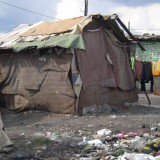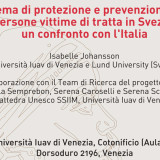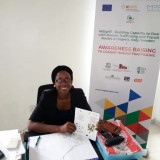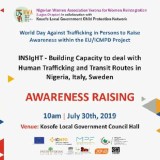
AIMS AND OBJECTIVES
SharingSpace overall goal is the creation of a network among research centers focusing on different features of international migration, with the aim to gain an understanding of the nexus between international migrants and collective urban space in cities of 2 European countries (Italy and Portugal) and 3 of the Global South (Argentina, Mexico and South Africa), as a critical feature of any social cohesion policy. SharingSpace provides the conditions for the exchange of researchers (both early-stage and experienced) devoted to the topic in different geographical and cultural urban contexts. SharingSpace specific aims are:
- to advance the research skills of involved researchers.
- to contribute to the advancement of interdisciplinary studies and research on social and spatial inclusion of international migrants in urban areas.
- to strengthen relations among participating research centres, with the objective of developing further common activities.
BACKGROUND
The number of international migrants is currently estimated to be over 210 millions. The direction of migration flows is mainly South to North or, more specifically, from low- and middle-income to high-income economies. However, international migration also follows a South-South direction: almost some 40 percent of all movements take place between countries in the South. When adding irregular migrants, whose numbers are unknown but certainly higher in developing countries than in Northern countries, migration flows in the South contribute to a large share of the worldwide migration.
Since the great majority of international migrants head towards cities, where job opportunities are highest, international migration has become essentially an urban phenomenon affecting all dimensions of policymaking, from local development, to education, health, housing and security.
The presence of diverse cultures within the city is often contradictory to the acceptance of common values and the objective of reconciling them may prove quite difficult. Collective space, a specific feature of European cities since always, is not just “space” but “place”, i.e. symbolic and evocative, where diverse people meet, talk, perform and attend different practices, participate, negotiate, conflict. As a result of the increasingly heterogeneous mix of the urban population the uses performed in collective space have multiplied and even if public space is in theory accessible to everybody, intangible lines of division between ‘cultural public spheres’ often lead to the exclusion of those perceived as not fitting.
Collective space is where the couple diversity/common values becomes most evident through the encounter, competition and conflict of individuals and communities. Given that in contemporary globalized cities collective space is where the presence of the other is the norm, it is exactly the place where the willingness of society to include or its stance to reject become manifest.
Through a comparative perspective, SharingSpace aims to enhance the understanding of the provision, use and perception of collective space looking at i) public policies adopted to cope with the demand for urban space by international migrants, and ii) practices to access urban space under circumstances of insufficient or inadequate response by public policies.
METHODS AND ACTIVITIES
SharingSpace takes an inter-disciplinary and cross-national approach to the analysis of collective space in increasingly diverse cities. The different disciplinary backgrounds that characterize the Project partners (urban policy; urban-social innovation; social anthropology, political science, citizenship and migrants rights) each provide beneficial analytical dimensions to the impact of international migration to urban areas and collective spaces. The participation of research centers from countries of different regions of the world allows to bring together multifaceted perspectives on the issue.
A significant proportion of the project is constituted by the interchange of researchers (both experienced and early stage) and scientific knowledge. On the basis of their own discipline and country-related experience, the visiting researchers will probe into the research work being carried out at the host research centre with the objective to contribute to its research capacity.
Awareness raising workshops will be organized in each concerned city to help local stakeholders (policy-makers, practitioners and civil society at large) to realize the importance of mutual understanding and tolerance when sharing urban spaces, as well as the crucial role public space might take in strengthening (or weakening) the sense of belonging and citizenship of any urban resident. Similarly, academic lectures will be delivered to convey the same concepts to students.
PARTNER ORGANIZATIONS AND TEAM MEMBERS
SSIIM Unesco Chair, Università Iuav di Venezia (Italy)
- Marcello Balbo
- Giovanna Marconi
- Elena Ostanel
- Adriano Cancellieri
- Leonardo Ciacci
- Simona Morini
- Paola Piscitelli
CEG Centro de Estudio Geográficos, Instituto de Geografia e Ordenamento do Territorio da Universidade de Lisboa (Portugal)
- Jorge Malheiros
- Sónia Pereira
- André Carmo
- Pedro Guimarães
- Anselmo Amilcar
- Ana Estevens
- José da Costa Ramos
IDAES Instituto de Altos Estudios Sociales, Universidad Nacional de San Martin, Buenos Aires, Argentina
Instituto de Investigaciones Dr. José María Luis Mora, Mexico City, Mexico
ACMS African Centre for Migrations & Society, University of the Witwatersrand, Johannesburg, South Africa
36 months, starting from December 2012
FUNDING
FP7-PEOPLE-2012-IRSES
IMPLEMENTED ACTIVITIES
 Study Period at CEG-IGOT, Lisbon (2 April > 2 July 2013)
Study Period at CEG-IGOT, Lisbon (2 April > 2 July 2013)
 Study Period at SSIIM Unesco Chair, Venice (19 September 2013 > 22 January 2014)
Study Period at SSIIM Unesco Chair, Venice (19 September 2013 > 22 January 2014)
 Study Period at ACMS, Johannesburg (2 March > 9 July 2014)
Study Period at ACMS, Johannesburg (2 March > 9 July 2014)
 Study Period at Instituto Mora, Mexico City (2 September > 10 December 2014)
Study Period at Instituto Mora, Mexico City (2 September > 10 December 2014)








